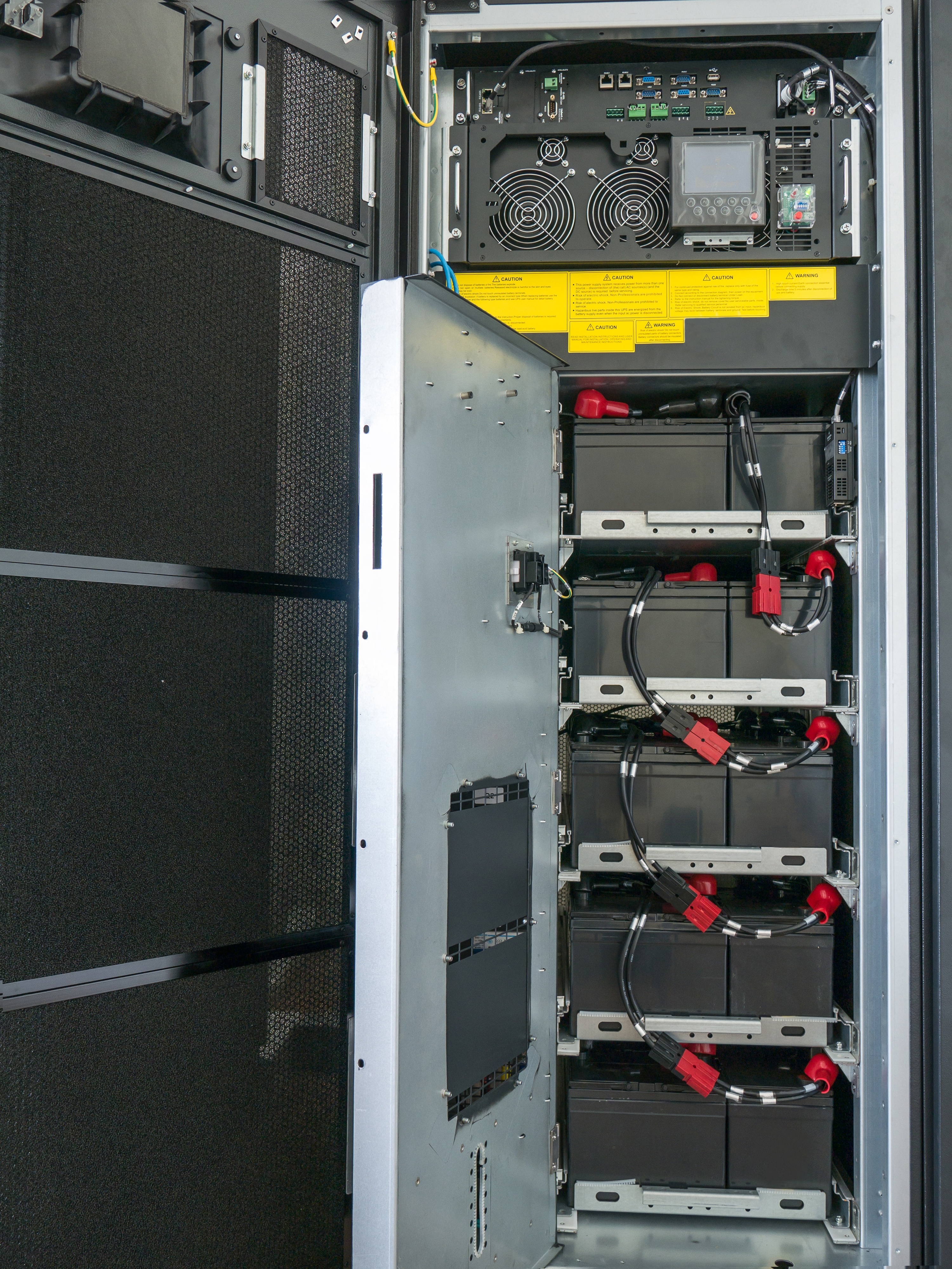A major purpose for data centers is to provide maximum uptime on all of their equipment. They achieve this by having redundant communications circuits, keeping the temperature at optimum levels, and ensuring the equipment has stable power at all times. While it is impossible for commercial power companies to guarantee 100% uptime on their services, a data center can keep things running by using an uninterruptible power supply, or “UPS” for short.
What is an Uninterruptible Power Supply?
As the name implies, UPS systems make sure that equipment never loses power. There are many different types and designs of uninterrupted power supplies. However, they all provide electricity to systems in the event that the commercial power source is down. The following are some of the different types of power systems that are often found in a data center:

- Individual Unit – An individual UPS unit has a bank of batteries that provide power to one or more pieces of computer equipment in the event of a power outage. This “battery backup” can typically provide power for anywhere from just a few minutes to several hours. Just how long depends on how much equipment you plug into it and the specific UPS model.
- High-Performance UPS – Larger UPS systems will typically have 6-12 outlets into which computer equipment is plugged. These function in much the same way as individual units, but can power more units for longer.
- Full Data Center UPS – In advanced data centers, it is common to have a centralized bank of batteries that power the entire facility in the event of a power outage. These batteries are typically set up to provide uninterrupted power for up to 30 minutes, during which time a diesel generator will kick on to maintain the required power indefinitely.
There are, of course, countless models from a lot of different companies that produce UPS systems. Finding the right one for a given situation will depend largely on the specific reason you need it for.
What is a UPS System Used For?
A UPS system provides power to equipment when commercial power goes offline. Some facilities will use a UPS system to power the entire facility, while others will only attach essential equipment. Either way, the point of this equipment is to ensure there are no unexpected outages due to power interruptions.
Large-scale data centers also use uninterrupted power supplies when performing maintenance on the electrical system. The electricians can manually allow the facility to run-off of the UPS while they perform their work. This helps the equipment stays up and running during the maintenance. It also ensures that electricians or other professionals aren’t facing unnecessary risks.
Benefits of an Uninterruptible Power Supply
When people think about the benefits of an uninterruptible power supply, they typically focus only on the fact that equipment won’t become unavailable during a power outage. While this is the most obvious advantage of having this type of system in place, there are several other benefits:
- Stopping Power Surges – A good UPS system has commercial power running through it and will intercept any potential power surges so that they don’t damage the equipment. This is especially important for sensitive electronic devices.
- Providing Even Electricity – Electricity doesn’t always come through an outlet at a perfectly consistent rate. The small power fluctuations won’t disrupt computer equipment, but over time, they can damage it. A UPS has the commercial power running through it, and in this process, it evens out the distribution to the equipment to prevent damage.
- Cut Back on Electrical Load – Large-scale data centers use a lot of electricity. Those that have a UPS system with a diesel generator can work with the commercial power company to operate on the generator during times of peak usage (usually very hot days in the summer). This earns the company significant credits from the power provider and helps the surrounding community avoid brown-outs.
Where to Store Your UPS System
When adding a UPS to your data center it is important to think about where it will be stored. UPS systems can range from about the size of a desktop computer to an entire room full of batteries. If the UPS provides power for the entire data center facility, it requires its own separate room for safety reasons. For most systems, however, the UPS will be installed close to the equipment that it will be powering.
When using a UPS to protect equipment in a server rack, for example, it’s best to mount the UPS on shelves within the rack. This allows the UPS to stay near the equipment. It also means that you can incorporate the electrical cords into your overall cable management system. When choosing the exact location for a UPS within a server rack, make sure to take heat generation into account. While a standard UPS system won’t give off a lot of heat, it can still benefit from good airflow.
Many data center managers will place one UPS in each rack, which is an efficient option to consider. In other situations, it may make sense to have multiple large UPS systems placed into a single rack, and the power cords for each row run into that rack. As long as all essential equipment is able to have power run through a UPS, the facility will be able to get all the benefits from these important systems.